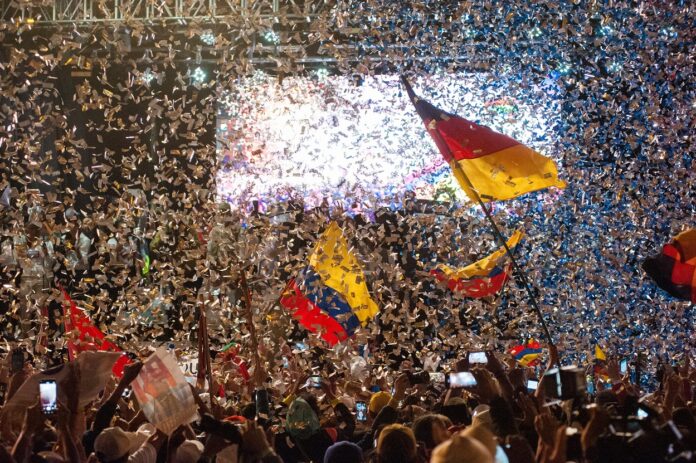The Historic Pact, a novel political proposal that is a protagonist on the electoral scene, is sailing through gusts and storms with a clear objective: to win the Colombian presidency in the first round on 29 May. However, the coalition will have to regain the initiative to put issues on the agenda in its favour and counteract the smear operations that are proliferating in the national press.
A force for change
The Pacto Histórico coalition marks a clear progressive trend, bringing together political forces from different ideological spectrums, ranging from the left to democratic liberalism. It should be made clear that, contrary to what is currently announced by the pro-government parties and several mass media, the political programme of the space led by Gustavo Petro is not exclusively in line with the ‘left’, which does not dominate the electoral front. Gustavo Petro has been the main articulator and from his figure has provided the hallmark of the Historical Pact; it is thus a progressive proposal, renewing unfinished ideas of liberalism (in particular the agrarian reform and industrialisation programme of Alfonso López Pumarejo called “the revolution in progress”), promoting the implementation of the 2016 Peace Accord, connected to contemporary problems such as climate change and overcoming neoliberalism.
According to the results of 13 March, the Historic Pact partially achieved its goals, becoming the most voted option and gaining a significant number of seats in Congress. However, the goal of achieving a majority in both chambers (55 in the Senate and 86 in the House of Representatives) was not met, and the coalition remains far from achieving it, even in alliance with the Comunes party (ex-FARC) and the Alianza Verde. Indeed, it will have to negotiate with Liberals and even “moderates” within the Partido de la U, Cambio Radical and possibly the Conservative Party. In addition, there will be 16 representatives from the regions where the armed conflict was most harshly experienced (within the framework of the so-called Special Transitory Peace Circumscriptions), nine of whom are in favour of the implementation of the Peace Accord, while the rest are waiting for the presidential elections to declare their alliances.
For the first time in the 21st century, the Conservative Party will have to choose to declare its opposition to a government. Although after Andrés Pastrana’s government the party was unable to contest the presidency, it has been part of government alliances in congress and ministerial composition in successive periods.
A starting point
Undoubtedly, the peace process initiated a decade ago and the signing of the Peace Accord between the Colombian state and the FARC-EP are the most important events of recent decades. The programme of reforms contained in the Agreement, and its rapid interruption by Uribism, revealed to the public the real national problems rooted in the effects of the neoliberalism of war, and opened the way for a rising cycle of mobilisations and the emergence of progressive expressions with real possibilities of becoming government. Such a programme of unfinished reforms is a starting point that has a political consensus in broad sectors, including the ruling class, as well as a legal framework that provides international legitimacy to advance vital reforms to cement economic change and social justice.
The programme of the Historic Pact, called “Colombia, a world power of life”, has the potential to be realised within this framework. It is a set of high-impact and widely-accepted measures, which will involve returning to the path of implementing what has been agreed. This, considering the difficult correlation of forces in Congress, despite an election, such as the previous one, unprecedented for an alternative force that positioned itself as the most voted.
The eventual triumph of Gustavo Petro and Francia Márquez on 29 May, which is getting closer and closer, would have a strong symbolic effect. There are no precedents for a progressive government in Colombia’s history: as a change of course materialises, popular expectations rise in turn.
Breadth and governability
On the road to the presidency there is a paradox: the more the Historical Pact depends on other forces to win, the more conditions it will have in its government policy. Added to this situation is the idea, almost like common sense, that incorporating more groups, and in particular those belonging to a faction of the ruling classes, will guarantee better governability. The question is governance or permanence in government?
Carrying out the reform programme to make Colombia a “world power of life” will involve a new pension and health system, recovering labour rights that are unknown to the younger generations of workers, generating alternatives to move towards a new energy matrix, but above all starting with the implementation of the Peace Agreement. The correlation of forces to achieve this is an unavoidable key that is made up of variables such as popular mobilisation (not only in marches, but also through open dialogue that amplifies politicisation and strengthens social organisation), the quality of those who implement public policies, parliamentary coordination, as well as relations with the United States and the business community. If a favourable balance is achieved, four years will have to be spent boldly in order to accumulate strength without dashing expectations. Against this backdrop, the Historical Pact should win in the first round with its own strength. Of course, this is the agonising task that occupies all the efforts of the present, which requires a truly epic campaign.
“The war has lost its centrality, although its mentors continue to make efforts to reproduce it”
Winning in the first round will not be the same as winning in the ballotage. Although after the parliamentary elections Gustavo Petro immediately called for the formation of a Broad Front that transcends the Historical Pact and brings together sectors of the traditional political forces that agree with his programme and are determined to separate themselves from Uribism, the degree of commitment with these forces is not yet sufficiently decisive to negotiate programmatic aspects. Should the election be settled in a second round, the negotiations and alliance frameworks will be more inclined to shape a government agenda beyond the Historic Pact, marking red lines around its programme.
Epicenter of the discussion
Petro has focused his proposals on the economic crisis suffered by the Colombian people, the same crisis that in 2021 led millions of people to become fed up and take to the streets between April and July. Hunger is perhaps the greatest household anguish and the immediate challenge for the next government. According to national statistics, poverty has reached 21 million people, which is expressed materially in the impossibility of accessing a full and regular diet. Moreover, it is estimated that 16 million of this population do not have enough to eat three meals a day. In a country with a vocation for agriculture, the pressing food insecurity that prevails is unacceptable.
Household indebtedness and unemployment are added to low incomes, making them the main reasons for social discontent, as shown by the CELAG survey in April. For the first time in the twenty-first century, the effects of neoliberalism have taken centre stage in the concerns of the majority, displacing the imaginary that “all problems are the fault of the guerrillas”. The war has lost its centrality, although its mentors continue to make efforts to reproduce it. It was in this context that the Historical Pact successfully elaborated its proposals, in particular the nationalisation of the pension system.
“The Colombian right is not exclusively pro-Uribe and can be recomposed from outside this cleavage”
So far, the campaign has focused attention on Gustavo Petro and his proposals, generally criticised by the other candidates. Both he and his vice-presidential running mate, Francia Márquez, have filled the political scene with an enlightening and disruptive style, respectively. Francia stands out for her leadership in Afro-Colombian communities and defence of nature against the advance of mega-mining, being a woman of popular extraction who has experienced the vicissitudes of the social and armed conflict. Her roots and her class have aroused the most opprobrious racism in the conservative culture, as well as an outrageous, sometimes slanderous, viciousness through journalistic investigations into her private life. Especially in the media, which generally shield the most prominent members of traditional politics. Against this backdrop, France has succeeded in installing the strongest message of the campaign: the invitation to “live tasty”, which has been received with high expectations.
Has the ruling class resigned itself to defeat?
The neoliberal crisis is linked to a crisis of hegemony that translates into the inability of a sector of the ruling class to realise the interests of the whole, to sustain the regime of accumulation and the rates of profit expected by the elite without social collapse. The growing repudiation of Uribism sets the tone for this process of loss of hegemony, but does not indicate the impossibility of the emergence of a new leadership that would recompose the stability of the regime and adapt to the cycle of reforms or succeed in blocking them; the Colombian right is not exclusively Uribist and can recompose itself from outside this cleavage. The loss of Uribism’s leading role opens up a dispute in which progressivism has an extraordinary opportunity.
Resistance to change is accompanied by sabre rattling, the instrumentalisation of control bodies and a constellation of narratives that instil fear. Army commander General Eduardo Zapateiro has been the protagonist of a flagrant episode of political meddling that violates the Constitution (article 219), by confronting Gustavo Petro for disseminating news about the death of soldiers and the collusion of the military with paramilitary groups and drug trafficking activities. While President Duque validated this fact and the control bodies of the Public Prosecutor’s Office ignored the complaints, the Procurator General’s Office sent a signal that anticipates its attitude towards exercising the role of opposition: it suspended the mayor of Medellín for three months for insinuating his support for the Historical Pact. The above is set by the media orchestra through which big business transmits its aversion to progressivism and threatens future cataclysms that Colombian society is already suffering as a result of the neoliberal model.
The threat of fraud or assassination remains latent. The denunciation of an operation to kill the progressive candidate corroborates that, on the one hand, the elimination of the political opponent is still in the plans of a sector that is interested in the current social order and, on the other, that they will be a factor of pressure through political violence in a hypothetical government of the Historical Pact. On fraud, the recent parliamentary elections set alarm bells ringing and showed that the manipulation of the elections in favour of the traditional parties was not a fantasy. The challenge is to recruit 113,000 “guardians of the vote” to supervise the ballot boxes at each polling station in Colombia and abroad.








